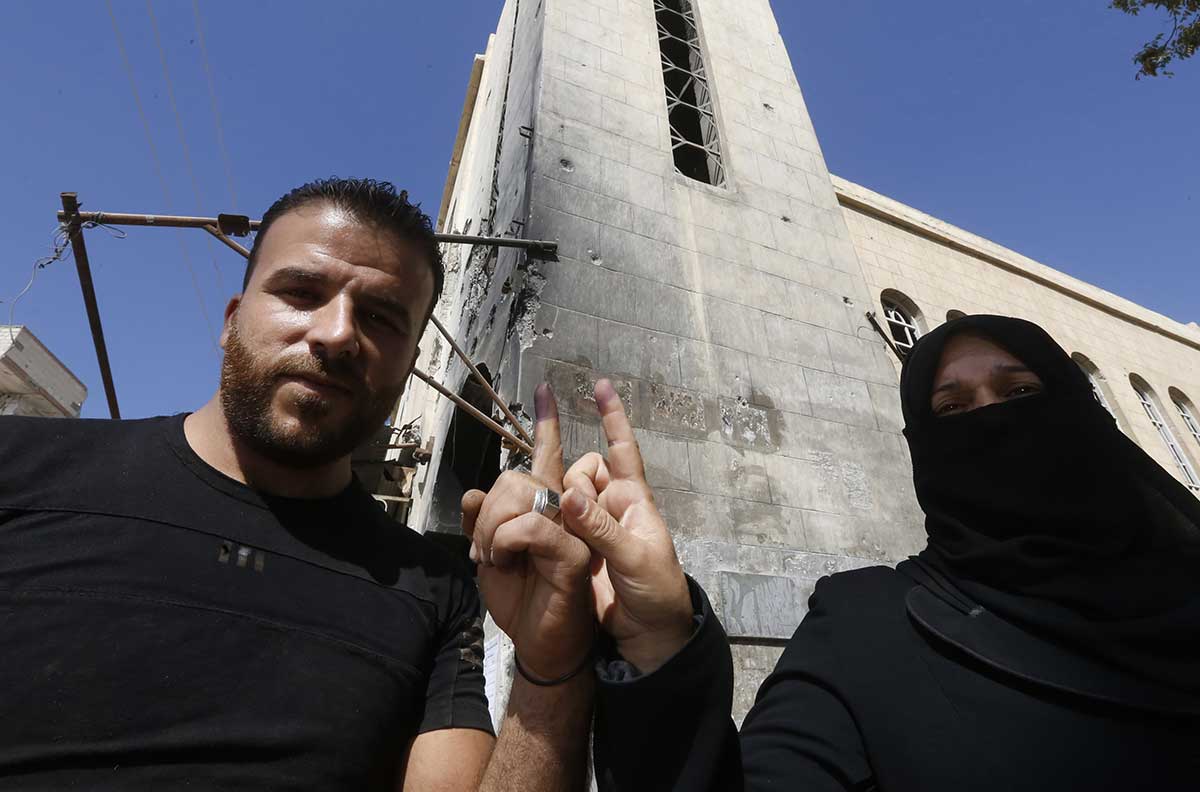Syrians in government-controlled areas cast their ballots on Sunday in the first local elections there since 2011, when the country’s ill-fated uprising erupted against President Bashar al-Assad’s rule.
Seven years since the last vote, the conflict has killed more than 360,000 people, forced millions more to flee, and left the economy in tatters.
Now, Syrian troops are back in control of around two-thirds of the country after a string of victories, most recently around Damascus and in southern Syria.
More than 6,550 voting centres opened at 7:00 am (0400 GMT) across government-held parts of the country, state media reported.
They will be open for 12 hours, with a potential five-hour extension depending on turnout, reported state news agency SANA.
It said more than 40,000 candidates would compete for 18,478 seats on local administrative councils.
In Damascus, election posters mostly featuring incumbents were plastered across public squares, including in the Old City.
Mohammad Kabbadi, a 42-year-old government employee, cast his ballot in the Bab Sharqi district of the capital for a candidate from his neighbourhood.
“I know exactly who I am going to vote for — he’s young, active and his victory will bring good things to residents of this area,” said Kabbadi.
‘Change for the better’
By the afternoon, authorities had not published any official turnout data.
But there appeared to be fewer people heading to the polls than in previous presidential or parliamentary elections, particularly as Sunday was a regular work day.
Still, Syrian state television broadcast footage of voters around Damascus and in the coastal government bastions of Tartus and Latakia dropping their ballots into plastic boxes as election officials looked on.
Voting was also under way in areas recaptured by the government over the past year, including the eastern city of Deir Ezzor, recaptured in full last October by Syrian troops after fierce battles against the Islamic State group.
Mohammad Tah, 36, said he was happy to vote but hoping for an improvement in the city’s ravaged infrastructure.
“I’m optimistic that the incoming council will rebuild and recover the city after the huge destruction suffered by years of fighting,” he told AFP by telephone from Deir Ezzor.
East of the capital Damascus, people trickled into a school being used as a voting centre in the town of Jisreen.
Jisreen was overrun by government troops this past spring as they seized the broader area of Eastern Ghouta from rebels in a blistering two-month assault that left the suburb in ruins.
“These are the first elections that happen in Jisreen since the problems began,” said Abu Haytham, a 64-year-old voter.
“We hope these elections will change things for the better, to pave the streets and improve the electricity.”
‘Why vote?’
No voting was taking place in areas outside government control, including Kurdish-held parts of the northeast and the largest rebel-held piece of territory, northwest Idlib province, home to some three million people.
Syrian troops have amassed around the opposition bastion for weeks, although an expected assault appears to be on hold for now as regime ally Russia and rebel backer Turkey try to hash out a deal on Idlib.
A vast majority of the candidates are members of the ruling Baath party or affiliated to it, which deterred some people from casting their ballot.
“Why vote? Will anything change? Let’s be honest,” said Humam, a 38-year-old working in the capital’s Mazzeh district who opted to stay at home on Sunday.
“Everyone knows the results are sealed in advance for a single party, whose members will win in a process that’s closer to an appointment than it is to an election.”
The number of seats had slightly increased from the roughly 17,000 available posts in the last elections, as smaller villages had been promoted to fully fledged municipalities.
Council members serve four-year terms at the municipal level and are mostly responsible for service provision and other administrative matters.
Those elected in this round are expected to have more responsibilities than their predecessors, particularly linked to reconstruction and urban development.
Syria last held local elections in December 2011, just nine months into the conflict.
It held parliamentary elections in 2016 and a presidential vote in 2014 that renewed Assad’s reign for another seven years.









